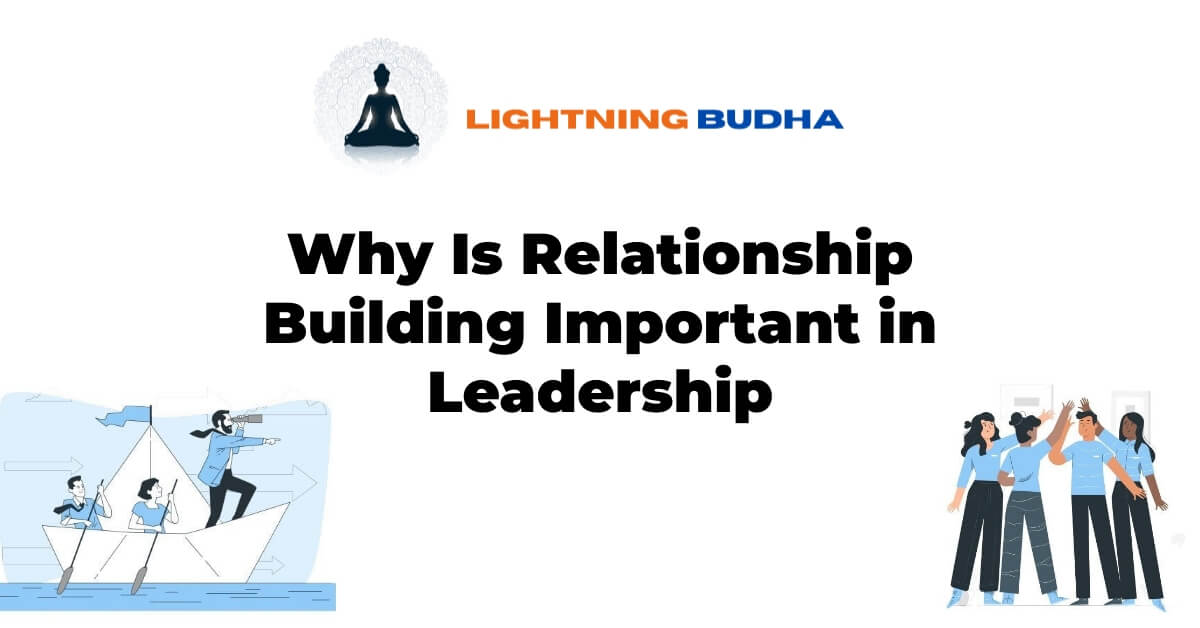Unlocking Success: Why Is Relationship Building Important in Leadership? Learn more about the value of developing relationships in leadership. Discover how strong connections foster trust, collaboration, engagement, and effective conflict resolution within teams.
Leadership is not just about guiding a team towards goals; it’s about fostering a sense of unity, trust, and collaboration among team members. At the heart of effective leadership lies the art of relationship building.
In this article, we will explore why relationship building is crucial in leadership and how it can drive success, growth, and a positive work environment.
Why Is Relationship Building Important in Leadership
Relationship building holds immense importance in leadership for several reasons. Imagine a leader who remains distant, aloof, and disconnected from their team members. While they may possess knowledge and technical skills, without strong relationships, their ability to effectively lead and inspire will be severely hindered.
Contrastingly, a leader who invests time and effort into building relationships creates an environment where trust, collaboration, and innovation flourish.

Relationship building allows leaders to truly understand the individuals they work with—their strengths, weaknesses, aspirations, and motivations. By taking the time to listen, empathize, and connect on a human level, leaders can establish a sturdy foundation of trust and respect.
When team members feel valued, heard, and understood, they are more likely to exceed expectations, take risks, and wholeheartedly invest their talents and energy into the shared vision.
In essence, relationship building is the lifeblood of leadership. It fuels collaboration, nurtures trust, and creates a profound sense of belonging. It empowers leaders to inspire and motivate their teams, navigate challenges with resilience, and unlock the full potential of every individual.
What Makes Relationship Building Important for Leadership?
In the realm of leadership, there is a fundamental truth that lies at the core of success: the power of relationships. When we speak of relationship building in the context of leadership, we are referring to the art of forging connections, fostering trust, and cultivating meaningful bonds with those around us. It is an essential ingredient that sets extraordinary leaders apart from the rest.

At its essence, leadership is not merely about commanding authority or making decisions from a position of power. True leadership is about inspiring, guiding, and motivating others towards a common goal. And this can only be achieved by building solid and genuine relationships.
Why is relationship building so crucial for leadership?
Well, picture a leader who is detached, aloof, and distant from their team members. They may be knowledgeable and technically skilled, but without strong relationships, their ability to effectively lead and inspire will be severely limited.
On the other hand, a leader who invests time and effort into building relationships creates an environment where trust, collaboration, and innovation thrive.

Moreover, relationships provide a platform for effective communication. Leaders who have nurtured strong bonds with their team members can convey their ideas, expectations, and feedback with clarity and compassion.
This fosters an open and honest dialogue, where ideas can be freely exchanged, conflicts can be resolved constructively, and collective wisdom can be harnessed to overcome challenges.
The Foundation of Trust
Imagine trust as the solid ground upon which a successful team is built. Relationship building is the cornerstone of trust in leadership. When leaders invest time and effort into building strong connections with their team members, trust naturally follows.
Relationship building is the lifeblood of leadership. It fuels collaboration, fosters trust, and creates a sense of belonging. It empowers leaders to inspire and motivate their teams, to navigate challenges with resilience, and to unlock the full potential of every individual.

- Open Communication: By maintaining open lines of communication, leaders create an environment where team members feel comfortable expressing their ideas, concerns, and feedback.
- Reliability: Leaders who consistently deliver on their promises and commitments earn the trust and respect of their team, setting the tone for a trustworthy relationship.
Whether you aspire to be a leader or are already in a leadership position, remember that investing in relationships is not a luxury but a necessity. It is the key that unlocks the door to exceptional leadership and paves the way to enduring success.
Driving Collaboration
Imagine a symphony where each instrument plays its part to create beautiful music. Relationship building encourages collaboration among team members, enhancing their ability to work together effectively.
- Team Unity: When team members have strong relationships with their leader and each other, they are more likely to work collaboratively, leveraging each other’s strengths.

- Shared Goals: Building relationships fosters a shared sense of purpose and commitment to the team’s goals, aligning everyone’s efforts towards a common vision.
Relationship building also helps leaders identify and nurture talent within their teams. By getting to know their team members on a personal level, leaders can recognize individual strengths and provide opportunities for growth and development. This not only benefits the individuals but also enhances the overall effectiveness and productivity of the team.
Boosting Morale and Engagement
Imagine a workplace where positivity and enthusiasm fill the air. Strong relationships between leaders and team members contribute to higher levels of morale and engagement.
- Recognition and Appreciation: Leaders who take the time to build relationships are more likely to recognize and appreciate their team members’ contributions, boosting their motivation.

- Investment in Growth: When team members feel valued and supported by their leader, they are more likely to be engaged in their work and motivated to achieve personal and professional growth.
Conflict Resolution
Imagine conflicts as clouds that temporarily obscure the sun. Building relationships equips leaders with the skills to handle conflicts effectively, transforming challenges into opportunities.
- Effective Communication: Strong relationships allow leaders to address conflicts through open and respectful communication, resolving issues before they escalate.

- Understanding Different Perspectives: Leaders who have built relationships with their team members are better equipped to understand their perspectives, leading to more empathetic conflict resolution.
Leading by Example
Imagine leadership as a torch that lights the way for others. Building relationships sets an example for team members, demonstrating the value of strong connections.
- Cultivating Empathy: Leaders who prioritize relationship building showcase empathy and emotional intelligence, inspiring their team members to do the same.

- Positive Work Environment: A leader who fosters positive relationships creates a work environment where mutual respect and support thrive, promoting overall well-being.
Conclusion
Relationship building is not a soft skill; it’s a fundamental aspect of effective leadership. As leaders invest time and effort into building strong connections with their team members, they create a foundation of trust, collaboration, and engagement that drives success.
By understanding the importance of relationship building, leaders can guide their teams towards shared goals while fostering an environment of respect, positivity, and growth. In the ever-evolving landscape of leadership, the ability to build meaningful relationships remains a timeless and invaluable asset.
Other Interesting Post To Read:
The Foundations of a Strong Relationship: Communication, Trust, and Respect
Conflict Resolution Techniques for Healthy Disagreements in Relationships
4 Nurturing Emotional Intimacy: Deepening the Connection with Your Partner



[…] Why Is Relationship Building Important in Leadership […]
[…] Why Is Relationship Building Important in Leadership […]